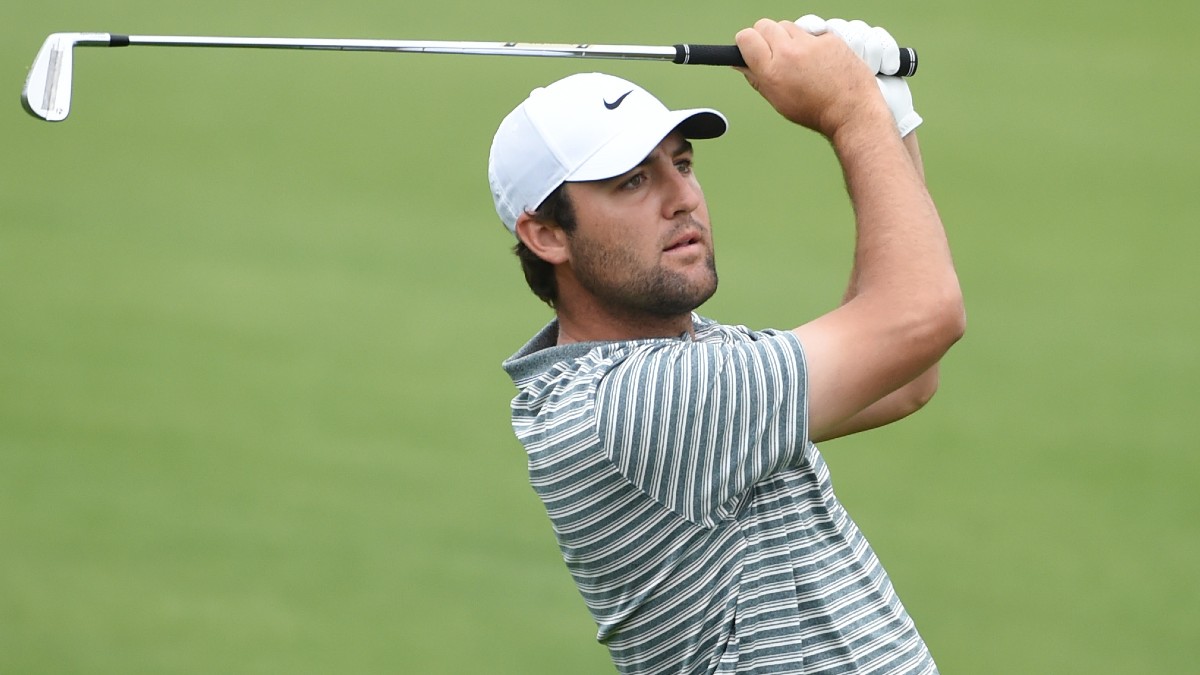
Steve Dykes/Getty Images. Pictured: Scottie Scheffler.
There are two ways to view U.S. Ryder Cup captain Steve Stricker’s half-dozen wildcard selections, which were announced Wednesday morning, two weeks in advance of this year’s competition: Either he took the proverbial ball out of his own hands by essentially picking the chalk instead of getting a little more creative, or he simply went with the most logical, sensible choices to round out the second half of his roster.
Count me among those who believes the latter. Only the final result will prove whether Stricker got it “right,” but for now, at least, he wasn’t wrong.
There exists an overarching theme to the picks of Daniel Berger, Harris English, Tony Finau, Jordan Xander Schauffele, Scottie Scheffler and Jordan Spieth: None of ‘em will cause any sort of dissonance in the team room and none of ‘em can’t play with anyone else on the roster.
Reminder:
3 years ago Harris English made a 10 footer on the final hole of the Wyndham to keep his card.
He just got named to the Ryder Cup.
— Monday Q Info (@acaseofthegolf1) September 8, 2021
In an event where team camaraderie is so often listed as an explanation for why an underdog European side has won more frequently than its American counterpart over the past two decades, Stricker’s decision to name six additional players to the side who aren’t just (mostly) long hitters and solid ball-strikers, but congenial enough to form that necessary camaraderie that may be the missing ingredient.
Again, none of this means the U.S. team will win. None of it means Stricker won’t be ripe for some good ol’ Monday morning quarterbacking in a few weeks, should Europe retain the title.
What it does mean, though, is that the captain did what he thinks will offer his team the best chance of winning – and until we see those results, it’s impossible to argue otherwise.
Let’s get to some other questions, some which were answered Wednesday and others which left behind some clues.
What was the biggest determining factor for these picks?
Stricker admittedly isn’t a big analytics guy, but on multiple occasions during Wednesday’s press conference, he mentioned favoring certain players for the Whistling Straits course fit – which is to say, those who can move it a long way off the tee.
Three years ago, the team in red, white and blue was left flat-footed at a Le Golf National venue which rewarded driving accuracy and precise wedge play, playing right into the Europeans’ hands. The home team is charged with setting up the host course, so we should expect Stricker and his growing band of assistant captains to stretch out an already-lengthy track to something near a maxed-out yardage.
No course in 2015 valued extra driving distance more than Whistling Straits did at the PGA Championship.
8 of the 12 members of Team USA ranked in the top-50 this season on Tour in driving distance. All but 1 player (Morikawa) had above-Tour-average distance this year.
— Justin Ray (@JustinRayGolf) September 8, 2021
If you’re going to do that, then it only makes sense to choose players who own the skillset to succeed in that environment.
But what about the notion of picking “in-form” players?
I’ve long been a disbeliever in the idea of picking a guy because he’s played well recently. Let’s consider this from a betting perspective: If a guy played well on a medium-length course in humid Atlanta, would you automatically pick him three weeks later on a longer course in potentially windblown Wisconsin?
There’s zero correlation here, yet we collectively tend to put on blinders when it comes to the Ryder Cup.
Here’s a stat for you: Three years ago, in the most recent edition of this event, some guy named Tiger Woods won on the Sunday before it started, then proceeded to go 0-4-0 in Paris. Want to blame his partners?
Here’s another example: Just last month, Kevin Kisner finished third-to-last at the WGC-FedEx St. Jude Invitational. The very next week, he won in Greensboro, garnering encouragement to be named to this team. The week after that, he finished third-to-last of those who missed the cut at the Northern Trust, then the following week, he tied for last at the BMW Championship.
The takeaway here is that form is fleeting. Stricker should be applauded for recognizing this, rather than knee-jerk reacting to results from last week which would’ve had little bearing on the Ryder Cup.
_PromoID=[245]
Did that seal the Kevins’ fate?
In addition to Kisner, there was also a groundswell of recent support for Kevin Na, who posted a share of the 72-hole low score at last week’s Tour Championship.
Together, they are a pair of gritty competitors and above-average putters, each of whom could’ve been a nuisance to any European opponent. That part isn’t debatable.
Reading between the lines of Stricker’s explanation, though – especially for Na – a lack of firepower that left each player outside the top 150 in driving distance this season kept them from being more serious candidates.
So, who was the last man in?
I thought Stricker’s announcement was revealing – not just the names, but how they were listed.
In previous years, U.S. captains have very obviously named the captain’s picks in order from first to last, essentially from the easiest selection to the toughest, even speaking at length about each one before moving on, letting the moment linger and leaving us to wonder for a little bit longer.
Stricker, on the other hand, read all six names swiftly – in alphabetical order. It was the classy way of not publicly revealing that one player was really the 12th man.
That said, if we had to take an educated guess, that player was likely Scheffler, who, despite being ranked 21st in the world ranking, has still never won a PGA TOUR title. Here’s what he does have on his side: He’s finished 19th-or-better in his last six major championship starts, he was runner-up at the WGC-Match Play and he ranked 22nd in strokes gained tee-to-green this season.
.@RyderCupUSA Team by World Rank (@OWGRltd)
Dustin Johnson (2)
Collin Morikawa (3)
Patrick Cantlay (4)
Xander Schauffele (5)
Justin Thomas (6)
Bryson DeChambeau (7)
Tony Finau (9)
Brooks Koepka (10)
Harris English (11)
Jordan Spieth (15)
Daniel Berger (16)
Scottie Scheffler (21)— Jeff Eisenband (@JeffEisenband) September 8, 2021
Personally, I wouldn’t have minded Jason Kokrak or Sam Burns here – each of whom would also fit this host track – but Scheffler is the right call.
_PromoID=[24]
OK, then who was the last man out?
Again, trying to read between Stricker’s subtle lines – he mentioned calling at least “five or six” players to let them know they hadn’t made the team – it’s hard to imagine Patrick Reed wasn’t the next player on his list. He’s the only one the captain claimed he “lost sleep over” by leaving off the team.
There are some obvious reasons why Reed could’ve/should’ve been on this team: He played the role of Captain America perfectly, shushing the opposing side and embracing the atmosphere of previous Ryder Cups. Throw in a short game that is amongst the world’s best and it’s easy to see why he was considered.
Of course, there are some even more relevant reasons why he isn’t on the team:
Namely, three years ago, Reed threw a few of his teammates under the bus after not getting his preferred pairings and he’s played just once in the past month, after missing three weeks due to an ankle injury followed by – more importantly – a hospital stay after contracting what he’s termed as bilateral pneumonia.
Even at 100 percent, Reed was a borderline pick, but at a number potentially less than that, he fell short.
Who is the potential replacement if an injured Brooks Koepka can’t play?
First things first. To all of the people concerned that Koepka, who WD’d from the Tour Championship last week due to a left wrist injury, will miss these festivities, a reminder:
This is the same dude who considers himself more athlete than golfer and prides himself on swallowing the pain and competing through it. Point is, unless that wrist is wedged into his elbow, expect him there.
The ink ain’t even dry, but let’s take a shot at this:
Fourballs:
• Thomas/Spieth
• Cantlay/Schauffele
• DeChambeau/Finau
• Johnson/SchefflerFoursomes:
• Thomas/Spieth
• Cantlay/Schauffele
• Koepka/Berger
• Morikawa/English— Jason Sobel (@JasonSobelTAN) September 8, 2021
If he can’t gut it out, though – if Stricker and the assistants and his fellow teammates talk him out of trying to compete through the injury – it stands to reason that Reed would be the last-minute addition. The captain repeatedly insisted Wednesday that there is currently no alternate, that he’ll deal with the situation if and when it arises.
Again, that leaves everything open to interpretation, but Reed or Webb Simpson – players who wouldn’t be flying blind as rookies – could be the subs.
_PromoID=[19]
